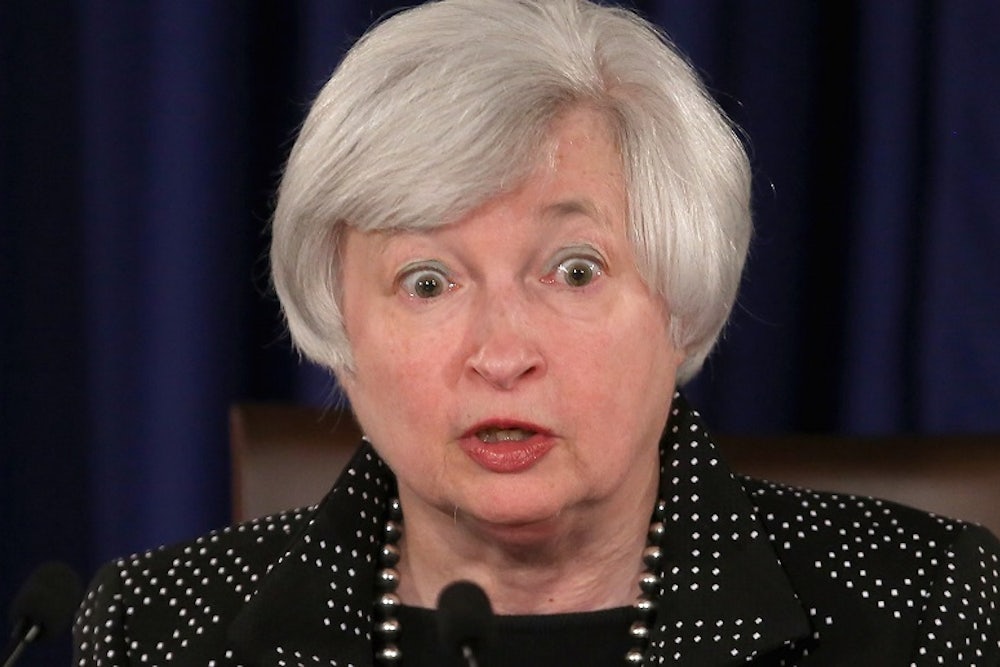Reform conservatives have had a big month. They released a new book, “Room to Grow,” that laid out a new, conservative reform agenda. Last Wednesday, Senator Marco Rubio became the most prominent conservative to pick up the reformicon mantle. But there is a big omission in this new agenda: It doesn’t have a solution to the current jobs crisis. And it's not because they're bereft of ideas. It's because the ideas they have are politically complicated.
In “Room to Grow,” Michael Strain offers a variety of smart policies to make it easier for the unemployed to work. One example is to eliminate many occupational licensing requirements. He also wants to give companies financial incentives in the form of tax credits for hiring the long-term unemployed and to reform the Social Security Disability Insurance program to remove disincentives to work (although that would not help fill the hole in demand). These ideas would undoubtedly help reduce unemployment, but it’s hard to see them helping millions of people find work.
In the New York Times last Friday, Ross Douthat, a reform conservative, made a similar omission. He argued that conservative, pro-work welfare reforms over the past two-plus decades have helped the economy and reduced poverty. But Douthat offers no solution to the current jobs-crisis. His pro-work policies may boost long-term growth, but they are insufficient to return the economy to full employment. Without a separate solution to the short-term hole in demand, reform conservatives do not have a complete economic agenda.
What’s surprising is that they actually do have an answer for this hole: monetary stimulus. In an article for National Affairs, Strain outlined many of the ideas in “Room to Grow,” but he also argued in favor of continued loose policy at the Federal Reserve. “Monetary policy surely offers the best way to boost aggregate demand in the short term,” Strain wrote. “By keeping the federal funds rate at zero and pursuing its long-term asset purchase program (known as quantitative easing or QE), the Federal Reserve has done much to support the economy during the Great Recession.” Strain then runs through a variety of different policies that the Fed could pursue, like allowing for higher inflation, that would boost growth in the short-term and fill the hole in aggregate demand. Douthat has also written in the past in favor of monetary stimulus. Many other reform conservatives have as well.
Which is why it’s strange that the words “monetary policy” never appear in “Room to Grow.” In fact, the Federal Reserve is only mentioned once in the 120-page book. This is undoubtedly a hard issue for reform conservatives. Republicans have been, if not openly hostile, then vehemently opposed to the Federal Reserve’s actions during the Obama presidency. When Fed chair Janet Yellen’s nomination was before the Senate in November, Rubio revealed his inflation paranoia and opposition to monetary stimulus. “Altogether, she has championed policies that have diminished people’s purchasing power by weakening the dollar, made long-term savings less attractive by diminishing returns on this important behavior, and put the U.S. economy at increased risk of higher inflation and another future boom-bust,” he said. In fact, it’s hard to find any Republican in Congress who supports the Fed’s actions.
And that may be the real reason that monetary policy is not in “Room to Grow.” Would Rubio still have become an ambassador for reform conservatism if it stipulated that loose monetary policy was necessary for the recovery? Rubio would be in an impossible spot. If he repudiated monetary stimulus, he would reveal a major divide between the GOP’s jobs platform and that of reform conservatives. But if he suddenly came out in support of the Fed, it would force him to admit that the Republican Party’s jobs platform has been missing a vital component for years.
But by leaving out monetary stimulus altogether, reform conservatives have eliminated that problem for Rubio and any other Republicans looking to support the policies in “Room to Grow.” This may be good for the reformicon’s ability to gain influence within the GOP, but it leaves a hole in their agenda.
